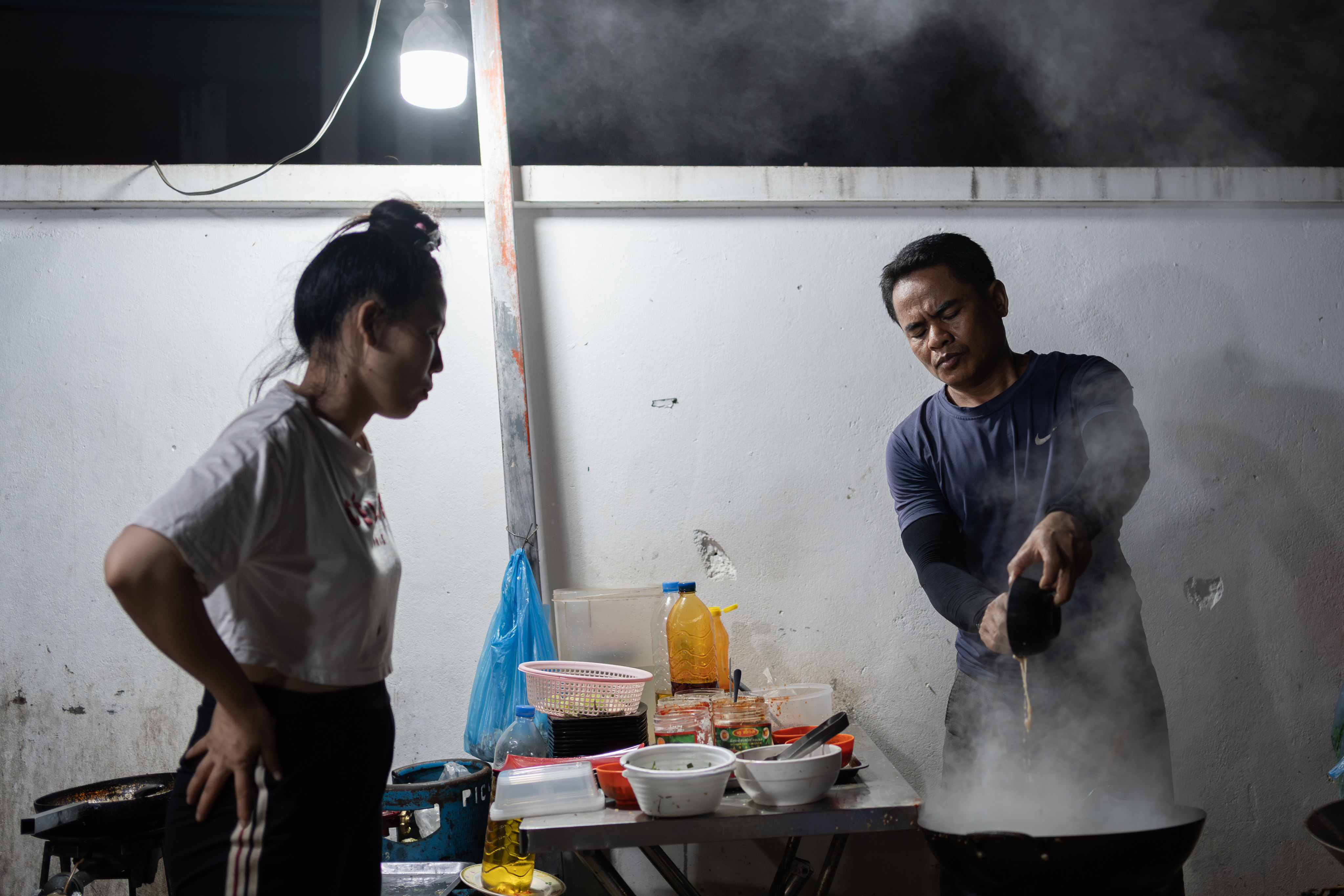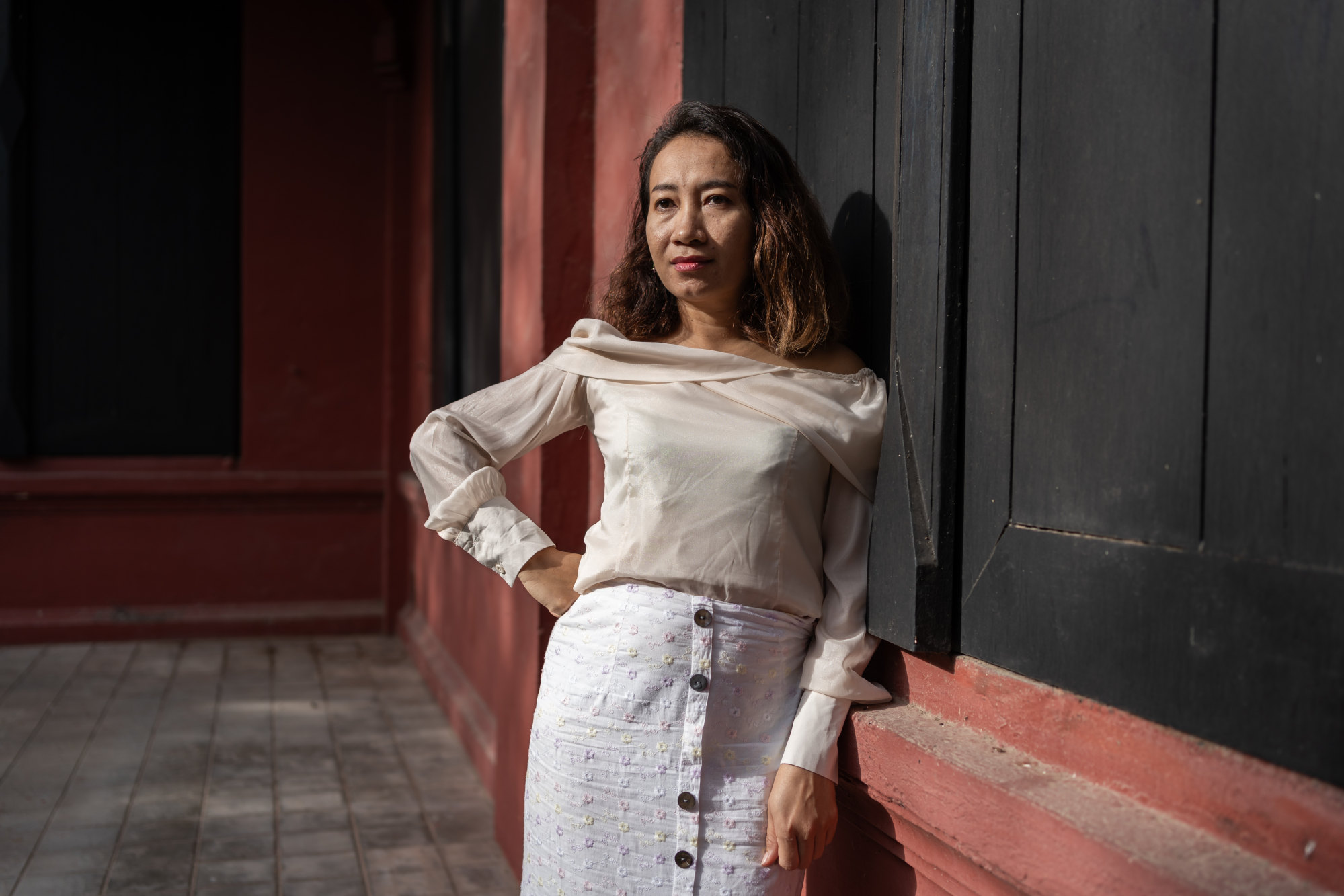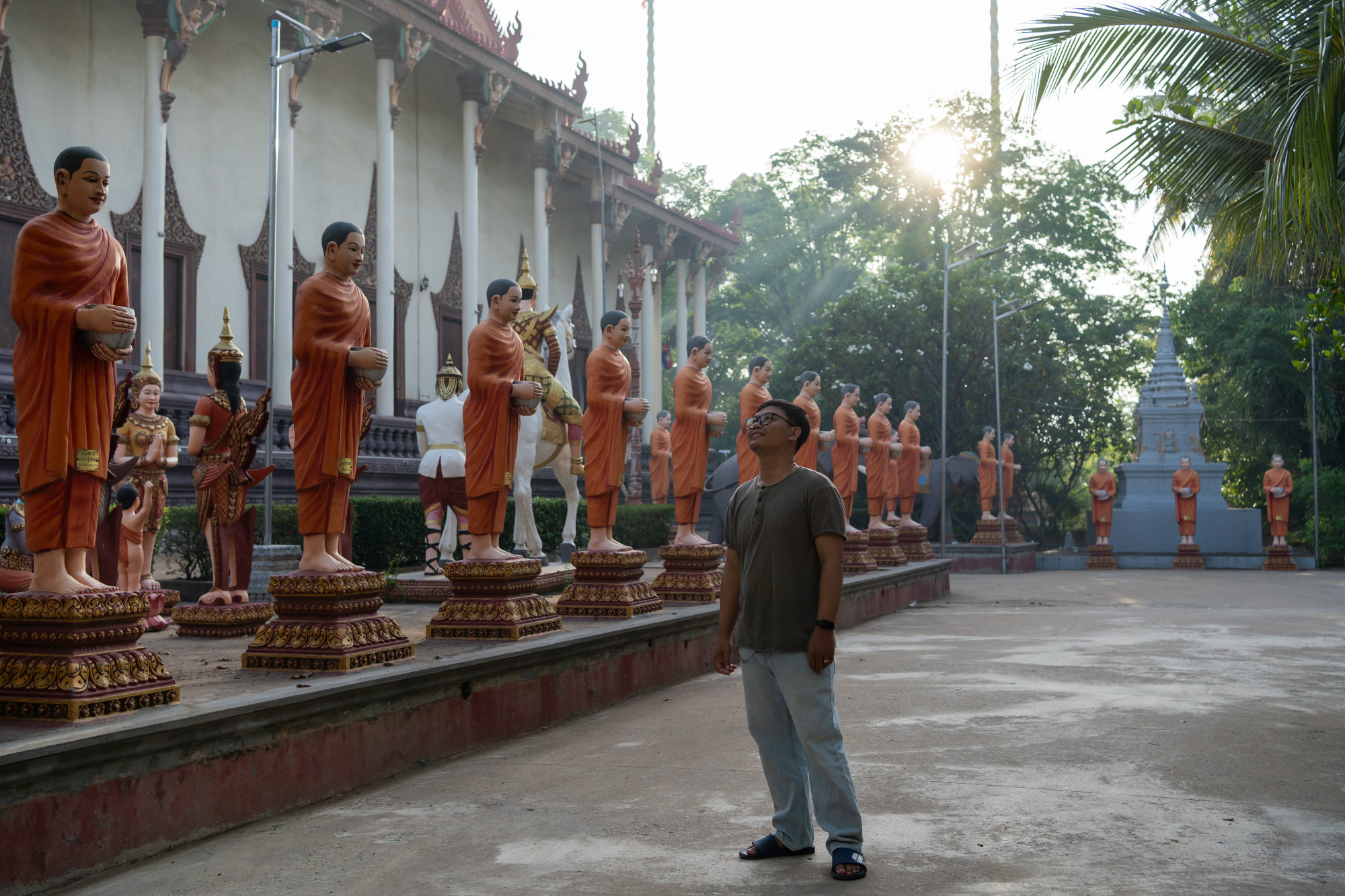
- Poet and former monk Chin Meas ekes out a living on his noodle cart in Siem Reap, but he still finds ways to express himself – when he has the energy
Chin Meas cracks a duck egg against the front corner of an empty, half-built hotel, 6km (4 miles) south of Angkor Wat, Cambodia’s most iconic attraction, which draws millions of visitors each year.
He stands at his makeshift kitchen one Saturday evening in June, as tuk-tuks and motorbikes fly by his food cart, stray dogs trot past and neon lights blink across the road. Fumes of chilli oil, cheap beer and urine scent the evening breeze.
Like any other Siem Reap noodle seller, Meas hustles for hungry tourists well past midnight, but few of his customers know that he is a renowned poet.
His verses, often critiques of inequity, corruption and environmental degradation, have been published in Cambodian anthologies and translated for regional literary magazines.

He also spent more than a decade as a monk and trained a generation of young poets. His former students and fellow writers believe he should hold a university position. Instead, the 43-year-old poet’s life is bound to the US$2.50 he earns for each steaming plate.
Meas and his wife, Kan Lida, moved to Siem Reap in 2015 hoping to earn a living on the periphery of the tourism industry until the pandemic devastated the city’s economy.
No foreign tourists sat in the plastic chairs and tables they had set up on the sandy dirt in sight of a pagoda wall scrawled with the phrase “no p***ing” in Khmer.
‘I was screaming for help’: the Cambodian brides trafficked into China
“My poems, whether people support them or not, all of the words come from what I have experienced in society, from what I have seen and heard,” says Meas, sweating over a flaming wok. “Why is it so unequal? I hold on to that feeling.
“People are supposed to love each other, help each other, that’s what I want.”
In a society firmly under the control of Prime Minister Hun Sen and his dominant Cambodian People’s Party (CPP), surviving as an independent thinker requires sacrifice, and Meas has renounced prestige, endured poverty and debt, and sent his two young children to stay with his mother-in-law across country, sparing them a life tied to the food stand.

Now, selling noodles 14 hours a day, every day of the week, an exhausted Meas struggles to continue writing poetry. When he cooks for his customers, he says he often thinks of the pot:
Despite the fire burns and hurts, it does not complain.
It stands strong to serve until the food is done.
Most days, Meas and Kan Lida do not stop for their own dinner until just before sunrise. A meal cannot be not delicious, they say, when interrupted by customers.
It’s such a waste of his lifePhina So, fellow poet and long-time fan of Meas
A car drops off the young owner of the half-completed hotel, their landlord. Drunk and red-faced, he goes directly to the cart and begins chopping a sausage, preparing a meal for himself.
He tries to flip an egg on the stove but stumbles into Kan Lida and the egg falls to the dirt. They all laugh.
“He eats here every night,” Meas says later. “We never bill. He works for the army.”
At around 2.30am, Meas and his wife began to disassemble the noodle stand, collecting the plastic chairs, loading up the bottles of sauces, putting away the propane stoves, washing out each bucket and wiping down the cart, dishes and tables.
How dams in China are destroying livelihoods downstream in Cambodia
Meas sweeps up the beer cans, napkins and scattered toothpicks, which once inspired verses:
Like before, they throw this one away
Until few toothpicks remain
Tossing them anywhere
Only the teeth are beautiful
People don’t care
Just like when they first used them.
A fellow poet and long-time fan of Meas’ poetry, Phina So laments the all-encompassing time he spends cooking noodles.
“He’s like a treasure for the country,” she says. “It’s such a waste of his life.”

Sometimes, as Meas labours, his mind becomes so intent on outlining verses that he forgets to take an order, he says.
Recently, he has been thinking about the activists who were arrested while exposing the illegal logging that has contributed to Cambodia being one of the most heavily deforested countries on Earth. He imagines he were a tree, splintered by a chainsaw.
“When it comes to society’s events, my heart is sensitive,” says Meas. “Like a sporting person uses their muscles, I’m training my heart to reflect.”
His poems might depict the collapse of riverbanks from sand-mining dredgers or a heron searching for a pond in which to fish as Phnom Penh’s last remaining natural lakes are filled in and bestowed to developers to build gated communities and mansions.

Meas also writes to past poets, describing modern Cambodia. To the 19th century poet Santhor Mok, who composed idyllic verses of wild oxen eating grass, Meas refigures the scene in darker terms:
… For I know that now
The oxen eat all.
If you could see,
You would feel such grief.
They eat mountains and forests, minerals and land
All kinds of fish,
Pebbles and sand,
Marble and rock,
Lakes and rivers,
Please understand.
“From what I have known and understood, I see that injustice happens more than justice,” says Meas. “Injustice happens to those who are poorer, those who don’t have power.”
How this looted Cambodian statue revealed a vast smuggling network
Hun Sen’s opponents and critics had been shot, exiled, sentenced to life imprisonment and forced from power by coup.
In the months leading up to the July 23 national elections, the main opposition party found itself disqualified from participating on a technicality, its activists targeted in attacks by masked men wielding batons, and the country’s leading independent media outlet was shut down.
“Even if Hun Sen does not become the prime minister, the political control is still in Hun Sen’s hands,” Hun Sen said in a June speech. “After Hun Sen there will be Hun Manet. Do not dream of getting rid of the Hun family.”

Many of Meas’ fellow Khmer poets say that the atmosphere of fear long ago infected the literary world, limiting the opportunities for emerging writers to have their work published.
In the early 2000s, Meas began submitting his poems to the newly formed non-profit Nou Hach Literary Association, and by 2007 he was winning awards in the association’s annual writing competition.
“We advocated for being creative, for breaking out of these traditional themes, so we got a lot of socially critical poetry,” says Nou Hach co-founder Teri Yamada, a professor of Asian studies at California State University, Long Beach. “[The association] was a protection for creativity. That has kind of gone underground now.”
Between 2007 and 2009, 10 of Meas’ poems received awards from the association’s annual literary competition of Khmer works, leading to translation into English and publication.
But a restrictive 2015 law overseeing non-governmental organisations, along with a local university’s requirement that Nou Hach pledge to avoid government criticism to use its facilities, led in part to the association’s collapse in 2019, says Yamada.
People with knowledge of poetry like [Meas] should be master teachers, giving insight to students into the use of words and emotionsYeng Chheangly, former student of Chin Meas
Like many Cambodian artists these days, Meas occasionally publishes his poetry through his Facebook page, where it is read only by a small circle of friends and followers. Facebook is akin to the internet in Cambodia and a cost-effective way of sharing his work.
Attempting to reach a larger audience, however, might be unwise, given that Cambodia’s Ministry of Culture maintains a watchful eye on the output of artists.
In his office, Department of Books and Reading director Kok Ros keeps the ministry’s Code of Conduct for Artists booklet, mandating an allegiance to the nation and the monarchy.
The ministry censors artists perceived to have broken these sweeping rules, sometimes leading to imprisonment.
How Chinese forced to run online scams in Cambodia can pay with their lives
In 2017, the ministry banned an actress from appearing in films for one year due to provocative dressing, while earlier this year, in January, the ministry asked national police to take action against a rap music video commemorating mass protests by garment workers, warning that the video contained “inciting content that may cause insecurity and social disorder”.
Ros says his ministry suppresses only art that has a “serious impact on the public”.
“We are the Ministry of Culture, we are not the army or police, so we are not supposed to handcuff people,” Ros says. “If it defames the country, we will summon you for instruction, and if you apologise, we will release you.”
Meas was born in 1980, the year after the collapse of Pol Pot’s Khmer Rouge regime, which had attempted to build a self-reliant communist society by annihilating all ties to capitalism and forcing agrarian reforms.
The resulting relocations and mass-imprisonments led to the deaths of at least 1.5 million Cambodians – about a quarter of the population.

Growing up in the aftermath of a genocide and with the Khmer Rouge still controlling much of northwest Cambodia, Meas collected snails and gathered sugar-palm fruits to support his family in the Kampong Cham countryside northeast of Phnom Penh.
“We didn’t have enough food, not enough of anything, the other kids and the elders also suffered,” he says. “I thought everyone on Earth, in every country, was suffering like this.”
Meas had to skip the second and third year of school because his father ordered him to watch the family’s cows full time, he recalls. But he managed to pass his fifth-grade exams aged 15.
“I could not continue to study, because at home I had a lot of work,” he says. “My father couldn’t read so he didn’t understand the value of studying.”
In 1996 Meas became a monk – the pagoda’s free education his only means of accessing books and knowledge. After mastering the more than 60 traditional Khmer poetic forms, he spent much of his 15 monastic years reading and writing poetry at Peam Mongkul pagoda, in Kandal province, an hour outside Phnom Penh.

Throughout the 2000s, Meas taught dharma discipline at junior schools in the mornings and offered free poetry classes to local youth in the afternoons, instructing them with home-made textbooks he had stapled together himself.
“I would not be a poet without him,” says one former student, Yeng Chheangly, 36, who lived near Peam Mongkul pagoda. “I didn’t have money to afford classes.”
Now an established poet whose work has been published in a range of locally produced anthologies, Chheangly recalls Meas’ lessons on metaphor, how a description of nature could carry more subversive meanings, concealing commentary on corruption, politics or ineffective governance.

Chheangly still recalls the first time he heard Meas’ 2007 poem, Raining in the Wrong Place:
Everything is trying to survive without water
Waiting for a better time
Hoping for the rain to come
And make everything better.
But when the rain comes
It falls somewhere else
The wind arises
And blows the rain to the sea
Years later, the poem still has the power to make Chheangly cry. “It raises a lot of points about the imbalances in society,” he says, recalling the period when the United Nations Transitional Authority in Cambodia (UNTAC) managed the country, between 1991 and 1993, and millions of dollars in donor money flowed to government agencies.
“UNTAC tried to make elections and aid came to Cambodia to rebuild the country, but we don’t know where it went. People were dying, they needed support and help, but when the help came, it went somewhere else.”

Chheangly has spent a decade trying to publish Meas’ poems as a collection. The cost to self-publish 1,000 copies of a book is at least US$1,200, Chheangly says. It’s an amount neither he nor Meas can afford.
A former judge of the Nou Hach literary competition persuaded a local publishing company, Nokor Wat, to publish 68 of Meas’ poems, written in Khmer, in a 2011 collection, the title of which translates to “Drop of Water”.
But the company later stopped publishing books and no further offers for a full collection of Meas’ work have materialised, Chheangly says.

Around once a year, Meas receives an opportunity to speak at literary panels and lead workshops, including at an event on July 14 hosted in Siem Reap by the literary NGO PEN Cambodia, where he read his poem Raining in the Wrong Place to local high school students.
“People with knowledge of poetry like him should be master teachers, giving insight to students into the use of words and emotions,” says Chheangly, who attended the workshop to support his former teacher. “Chin Meas should be doing that, teaching poetry. He should be selling poems.”
Buddhist authorities at Peam Mongkul pagoda have repeatedly asked Meas to accept the role of achar, presiding over the pagoda’s ceremonies.
It would be an appointment of relative influence if not affluence, Meas acknowledges, but he adds that he does not want to become reliant on Buddhism for his livelihood, preferring to earn an income from his own labour.

He had felt this way in 2010, when he left the monkhood to marry Kan Lida, who had grown up next to the pagoda and was once his student.
Yet in business, Meas has been unlucky. Rows of empty breeze-block pig pens behind his wife’s family home attest to the disease that wiped out a livestock venture with his brother-in-law.
And in his attempts to sell sugar palms in his wife’s village, as he had in his youth, he was not able earn enough to support his family.
A family-built pond, another endeavour, remained filled with fish but no one was willing to kill them and violate Buddhist principle.
China wants bananas. But why are Cambodia’s banana workers getting sick?
Then came the debt. Meas’ sister-in-law had taken out the loan several years ago and absconded when her clothing business collapsed.
The land Kan Lida’s childhood home was built on had been placed as collateral and the family feared the bank would reclaim it unless Meas and his wife agreed to repay the US$45,000 loan, beginning in 2019.
They started by selling their stand at her hometown market and most of the small amount of farmland they owned.
Since then, every month, Meas and his wife have sent hundreds of dollars to pay back the bank for the renovated home’s new rooms, granite-tiled floors, metal stair rails and burgundy painted walls. They still have another US$9,000 left to pay.
Sometimes, I am lazy. I’m tired of it, as life is so boring. But, I have one purpose … My last days in life, I will spend as a poet, until the day that I dieChin Meas
A more lucrative path had once been available. Many years ago, the Ministry of Religion had offered Meas a high-level position. The job would have brought time. Time to think. Time to write. Time for his children.
A US$3,000 payment was required to secure the position, although that would likely have been the first of many such “conditions”. The price of the bribe itself was not the problem, but the dharma Meas follows prohibited him from accepting.
Instead, before dawn on a typical Sunday, Meas stacks more than 20 chairs onto his back and staggers towards the abandoned hotel to store them in an unfinished concrete room, beneath harsh fluorescent lighting.
He and Kan Lida have worked so late that the morning market vendors are already arriving when they finally close the latches on their noodle cart. It’s past 4am when Meas and Kan Lida reach home and peel off their socks.
Budget air travel in 2023 vs 2018: Asia trip highlights how bad things are
Kan Lida sets a bundle of vegetables down and immediately begins snipping and plucking the leaves of the next day’s morning glory and bok choy.
Only when the vegetables have been prepared and they have both showered, and Kan Lida has brushed her long hair, do they sit down to dinner: two smoked fish.
Meas sets his phone on the table and turns on Radio Free Asia. They listen, and the ceiling light casts their shadows far into the rice fields.
Outside, under clouds streaked with the blue of the remaining night, come the howls of dogs, the hum of insects and the first crows of roosters.
After more than 12 hours’ work, they have made a profit of US$20. They also owe US$378.63 to the bank for the month.

The next day, before preparations for work resume, Meas brings out a pile of dusty notebooks, revealing the scribbles of his drafts and their neatly copied final forms. He flips through hundreds of poems, most of which have never been read by anyone but himself.
Then the first droplets of the afternoon showers smatter the tin rooftop with a soft, insistent patter. The grey sky promises a storm. It is raining, and nothing is yet getting better.
Meas gathers up the notebooks, places them in a plastic bag, and put his poems away, somewhere safe.
“I may not be able to find time to write,” he says. “Sometimes, I am lazy. I’m tired of it, as life is so boring. But, I have one purpose, and I have to try the best I can to still do it in the future – I hope that I will stop my work after my children graduate.
“My last days in life, I will spend as a poet, until the day that I die.”
Additional reporting by Andy Ball.

